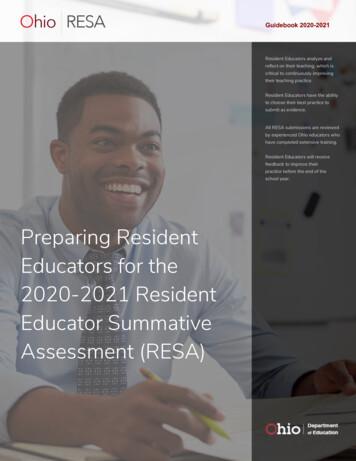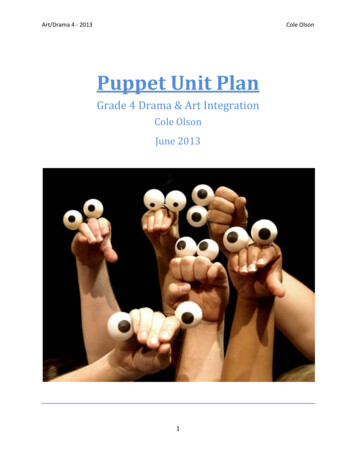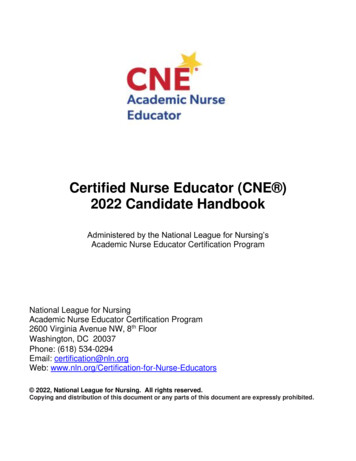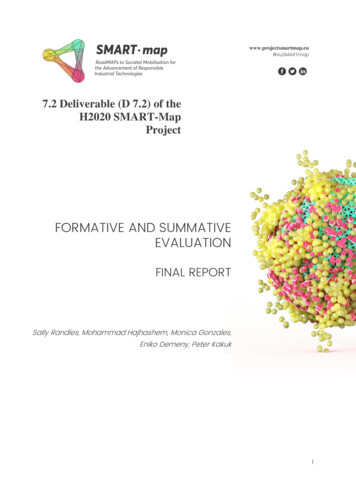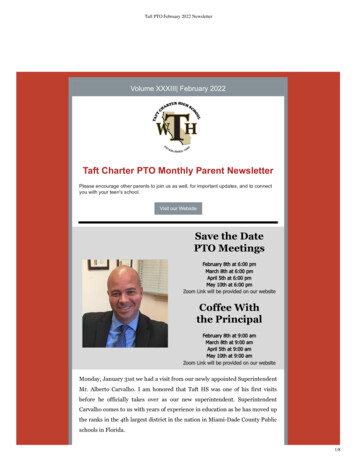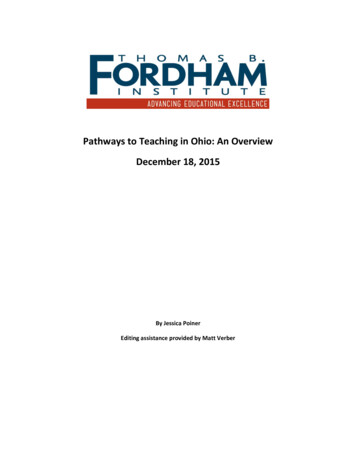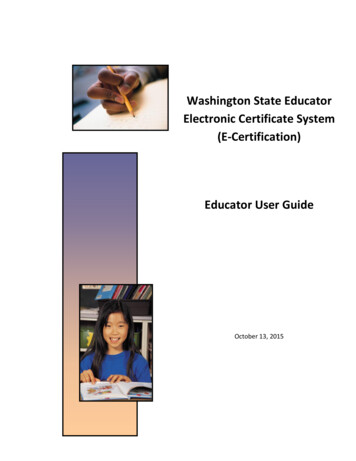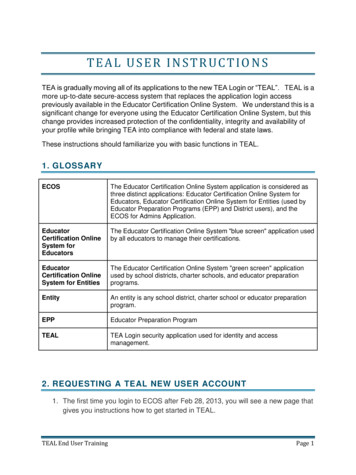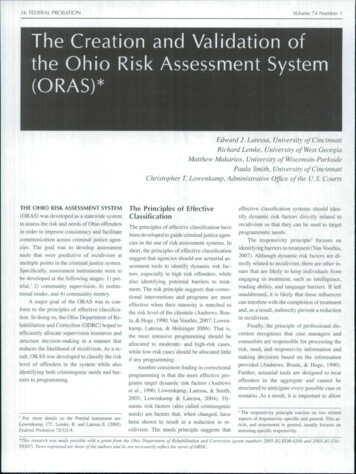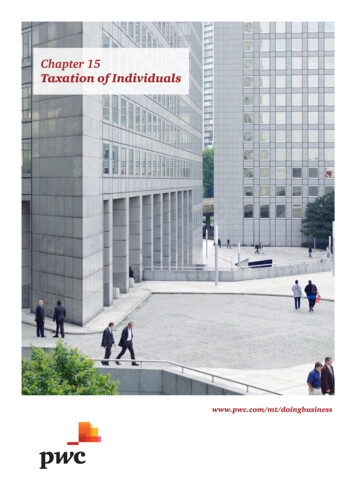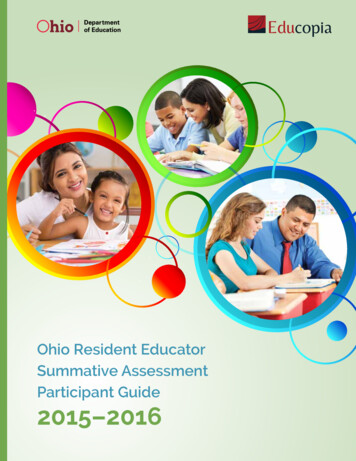
Transcription
Ohio Resident EducatorSummative AssessmentParticipant Guide2015–2016
TA B LE O F CO N T E N TSSection A: Getting Started and Registering for the RESA. 4Section B: Special Circumstances Task Modification Processand Accommodations for Candidates with Disabilities.6Section C: Process for Candidates Retaking the RESA in 2015–2016. 9Reflection on Teaching Practice Based on Feedback from Colleagues.10Section D: Guide to Using the Online RESA Submission System.17Section E: Recommendations for Task and Evidence Selection. 20Section F: Uploading, Segmenting, and Submitting Evidence Reference Guide(Video, Audio, and PDFs).21Section G: RESA Instructional Evidence Reference Guide. 26Section H: Disqualified Submissions. 30Section I: How the RESA Is Scored.34Section J: Program Coordinator and Facilitator Guidelines forSupporting Resident Educators.35Section K: Glossary of Key Terms as They Are Used in the RESA.37Ohio RESA 2015–2016 2015 Educopia, LLC.2
R ESA S UBM I S S I O N S CHE D U L E 20 1 5 – 20 1 6Submission Deadline #2Submission Deadline #1 Second Lesson Cycle Communication andProfessional Growth All Retake Tasks First Lesson CycleSubmissionWindow Opens!October 1 Formative andSummative AssessmentDecember 152015Score ReportsReleasedFebruary 15June 152016 SEPTEMBER OCTOBER NOVEMBER DECEMBER JANUARY FEBRUARY MARCH APRIL MAY JUNE JULY AUGUSTFirstLesson CycleFormative andSummativeAssessmentSubmissionWindow ClosesSecond Lesson CycleCommunication andProfessional GrowthALL TASKS (Retake Candidates)Ohio RESA 2015–2016 2015 Educopia, LLC.3
SE CTIO N A:Getting Started and Registering for the RESACandidate ResourcesQUICK TIP:There are six essential sources of information to support RESA candidates:You should1. The RESA Instrument: This document contains descriptions of eachperformance task, an overview of the materials you must submit, the full text ofeach task and corresponding forms and rubrics, as well as task-specific guidanceand support.2. The RESA Participant Guide: This document contains supporting informationand important appendices for the RESA.3. The Ohio RESA website and submission system: www.educopia.com/resa. TheOhio RESA website is your source for the most current information on the RESA,including:read the RESAInstrumentand this RESAParticipant Guidein their entirety. Candidate Frequently Asked Questions Candidate Resources (e.g., webinars, screencasts, and other technical guides) Candidate communications (posted on the News page) Access to the RESA submission system4. Candidate emails: The Ohio RESA Team communicates regularly withcandidates via email. These communications contain reminders, tips, and links toessential resources to help candidates with their submissions.5. The RESA Help Desk: Available Monday through Friday, 2 p.m.–10 p.m. EST, bycalling toll free 855-538-8634 or by emailing resa@educopia.com, the Help Deskcan answer questions about registering for the RESA or submitting forms andevidence.6. Ohio Department of Education: Questions related to licensure, RESA eligibility,and the Resident Educator Program should be sent to the Ohio Department ofEducation (ODE) at OhioRESA@education.ohio.gov. Candidates can also findinformation at the ODE RESA webpage: RESA.RegistrationIf you are a resident educator who is eligible to take the 2015–2016 RESA,your Program Coordinator must register you as a RESA candidate with theOhio Department of Education CORE no later than November 15, 2015. COREregistration will open on September 1, 2015. Please provide your ProgramCoordinator with your correct email address so there will be no issue in accessingyour account activation link. After Educopia receives your candidate registrationconfirmation from the ODE, Educopia will send you an activation email that containsa unique link to a registration page. You will be asked to create an online accountwith a username and password and supply an answer to a security question. Youwill also need your Educator State ID to complete registration.Ohio RESA 2015–2016 2015 Educopia, LLC.Candidates can find theirEducator State IDs de.core.EducatorProfile.UI/EducatorSearch.aspx4
If you do not receive an invitation to register with Educopia by November 15, youshould first check all email folders to see if your email provider automaticallyfiled Educopia’s email in your spam or junk mail folder. Next, you should contactyour Program Coordinator to confirm that you have been registered as a RESAcandidate with the ODE and confirm that the correct email address was used.To ensure thatIf you have confirmed that you have been accurately registered with the ODEand have still not received an activation email from Educopia, you shouldcontact Educopia’s RESA Help Desk by calling 855-538-8634, Monday throughFriday, 2 p.m.–10 p.m. EST.you should confirmResident Educator Program EligibilityTo be eligible to participate in the Resident Educator Program, beginningteachers must: Hold a valid resident educator license or alternative resident educatorlicense of any type, or a one-year out-of-state educator license;you receive theactivation email,that your ProgramCoordinator usesyour most currentemail addresswhen registeringwith the ODE. You Be employed by an ODE-chartered educational entity, ODE- or ODJFSlicensed preschool, Ohio correctional facility, or a private educationalagency located in Ohio;should also add Teach at least two classes or .25 FTE in their area of licensure or in the areain which the teacher holds a supplemental teaching license;domains to your Be responsible for planning and delivering standards-based, pre-K–12curriculum to students and evaluating their progress;contacts or safe- Work 120 days as defined by Ohio Revised Code; and Be assigned an ODE-certified, trained mentor by their employer.the following emailsender list: @educopia.com @mailchimp.comRESA EligibilityTo be eligible to take the RESA, candidates must be in the third or fourth year ofthe Resident Educator Program, and inform their Program Coordinator that theywill be taking the RESA.Ohio RESA 2015–2016 2015 Educopia, LLC.5
SE CTIO N B :Special Circumstances Task Modification Process andAccommodations for Candidates with DisabilitiesSpecial Circumstances and Task Modification ProcessNOTE:The RESA is composed of four required performance tasks. The RESA Instrumentprovides detailed descriptions of the requirements for the completion of each task.It is understood that particular conditions may exist (special circumstances) thatwill not allow you to complete the First Lesson Cycle, Formative and SummativeAssessment, and Second Lesson Cycle Tasks, as they are outlined in the RESAInstrument. The following special circumstances are accepted:Submissions byas applicable to the First and Second Lesson Cycle Tasks, learning institutions that guarantee individual client confidentiality and privacy,afforded by law, and therefore prohibit the use of any media that record imageor voice of a client or client family (i.e., youth correctional facilities, residentialfacilities).as applicable to the Formative and Summative Assessment Task, a class that is composed of less than three students who are studying acommon lesson and taking a common assessment. a co-teaching assignment in which a RESA Candidate is in a self-containedclassroom with another RESA Candidate from the current year and there arefewer than 6 students in that classroom.If you believe that either of the above special circumstances apply to your teachingassignment and make it impossible to complete the RESA task(s) as outlined in theRESA Instrument, see the task modification process below.Task Modification Process and TimelineIn order to make a RESA task modification request, you will need to work with yourProgram Coordinator to complete the RESA Special Circumstances Request Form(available on the Ohio RESA Candidate Resources page). On the RESA SpecialCircumstances Request Form, you must describe why your teaching circumstancesmake it impossible for you to complete the task as described and propose a plan forthe task modification required.Your completed RESA Special Circumstances Request Form must be returned to theODE at OhioRESA@education.ohio.gov no later than November 15, 2015.The ODE will review your request and inform you of its decision within two weeksof receiving the request. If your request is approved, Educopia will contactyour Program Coordinator and determine the appropriate modifications andaccommodations for that particular task. If a live observation is granted for the Firstand Second Lesson Cycle Tasks and/or the Formative and Summative AssessmentTask, you and your Program Coordinator must follow the Live Observation Policy andProtocols (which will be distributed after task modification approval). If your request isOhio RESA 2015–2016 2015 Educopia, LLC.candidates whoare granted specialcircumstancesapproval will beseparated fromthe general RESAscoring pool. Thesesubmissions willbe scored by anassessor whounderstands both thetask modificationsand the uniquecontext in which thecandidate has beenteaching. Completionof the RESA SpecialCircumstancesRequest Form doesnot exempt residenteducators fromthe requirement tocomplete a task,but if approved,it may allow formodifications to bemade for specifictasks by Educopia.6
denied, you will also receive an email from the ODE. If you would like to know why your request was denied, you mayreply to the email and request an explanation.Special circumstances requests are used to provide modifications to tasks; however, the special circumstances formshould not be used to request an extension on deadlines.Accommodations for RESA Candidates with Documented DisabilitiesEducopia is committed to providing appropriate testing accommodations for candidates with documenteddisabilities or health-related needs, as recognized under the Americans with Disabilities Act Amendments Act (ADAAAmendments Act). To request accommodations for the 2015–2016 RESA, and to ensure that a timely response isreceived, submit a detailed request in writing (as outlined below), along with supporting documentation, toadele@educopia.com by October 15th. The RESA Accommodations Request Form can be found on the Ohio RESAResources page. Because many accommodations require early planning, requests for accommodations should bemade at least four weeks prior to the CORE registration deadline and the administration of the assessment.Educopia will not release any information regarding an individual’s diagnosis or medical information without his or herinformed written consent, or under legal compulsion.The Ohio RESA Team will address each request for accommodations on a case-by-case basis. Alternative testingarrangements that are appropriate in the context of this assessment and supported by documentation of disabilitymay be provided for candidates who have a disability. If you are denied some or all of the accommodations that yourequested, you may appeal and ask Educopia to consider additional documentation of your disability.Acceptable documentation meets six broad criteria:1. The diagnosis is clearly stated.2. Information is current (issued within the last five years).3. Educational, developmental, and medical history is presented.4. The diagnosis is supported.5. The functional limitation for accessibility or accommodations is described.6. The medical evaluators’ professional credentials are established. Documentation should come on officialletterhead, and documentation should include the date and type of the mental health professional’s or medicaldoctor’s license and the state or other jurisdiction in which it was issued.Based on documented disability and supported documentation, accommodations may includethe following.Presentation accommodations: Presentation accommodations alter the method or format used to administer theRESA to an educator by changing any, or a combination, of the auditory, tactile, and visual characteristics. Educatorswho benefit most from presentation accommodations are those with disabilities that affect their reading of standardprint, typically as a result of a physical, sensory, cognitive, or specific learning disability. Presentation accommodationsmay include: Braille or large-print versions of the RESA Instrument, RESA Participant Guide, and resources (e.g., webinars,documents featured on the RESA Resources page) designed to support candidates with the submission process Special assistance with the online system, including but not limited to providing screen reader/writer software orthe use of a readerOhio RESA 2015–2016 2015 Educopia, LLC.7
Response accommodations: Response accommodations allow educators to use an alternative method for providingresponses to test items. Response accommodations can benefit educators who have physical, sensory, or learningdisabilities, and who have difficulties with memory, fine-motor skills, sequencing, directionality, alignment, andorganization. Response accommodations may include: The use of a scribe The use of American Sign Language (ASL) in video submissionsTiming and scheduling accommodations: Timing and scheduling accommodations are changes in the allowablelength of time in which an educator may complete the test. Because the RESA is an untimed, online assessment,timing accommodations may benefit educators who require emergency accommodations (see below).Scoring and reporting accommodations: Candidates whose submissions contain American Sign Language (ASL) willbe scored by a qualified assessor who understands ASL. Braille or large-print versions of the Candidate Score Reportwill also be available for candidates whose sight is impaired.Emergency accommodations: An emergency accommodation may be appropriate for an educator who incursa temporary disabling condition that interferes with the educator’s ability to complete the RESA within the RESAsubmission window. Cases include educators who have a recently fractured limb (e.g., arm, wrist, or shoulder) or aserious or prolonged illness or injury. If appropriate, the educator may submit the RESA Accommodations RequestForm at the time when the accommodation is needed. Educators may not submit a RESA Accommodations RequestForm for emergency accommodation after the submission window has closed on February 15, 2016.Ohio RESA 2015–2016 2015 Educopia, LLC.8
SE CTIO N C :Process for Candidates Retaking the RESA in 2015–2016The 2014–2015 RESA candidates who did not complete one or more RESA taskswill need to submit each of the relevant tasks during the 2015–2016 school year. Inaddition, if any of the tasks submitted by candidates were disqualified by the RESAassessors, candidates will be required to resubmit these tasks as well. Notificationregarding which submitted tasks were disqualified will be included in the 2014–2015 Candidate Score Report in September 2015. Concurrent with the release ofscore reports, 2014–2015 candidates will receive an email with instructions on howto retrieve their final scores from a secure website. Candidates must resubmit anytask that does not receive a passing score. The deadline for all resubmitted tasks isFebruary 15, 2016.Instructions for Candidates Retaking the Reflection on TeachingPractice Based on Feedback from Colleagues Task in 2015–2016While the Reflection on Teaching Practice Based on Feedback from ColleaguesTask is not included in the 2015–2016 RESA administration, candidates who didnot submit or did not pass this task in a prior RESA administration will need tocomplete this task in 2015–2016 in order to successfully pass the RESA. As such,a modified version of this task will only be available to candidates from prioradministrations. For these candidates, administration of the Tripod Student Surveywill be eliminated as a requirement, but all candidates retaking this task willneed to complete the task using feedback from the colleague observation. Theobservation instructions and task forms are found below.Ohio RESA 2015–2016 2015 Educopia, LLC.REMINDER: You must compileyour submissionevidence fromstudents you areteaching during the2015–2016 schoolyear. Evidence fromstudents obtainedduring the 2014–2015 year (withthe exception ofForm 4.3 of theCommunication andProfessional GrowthTask) is not allowed. You may notresubmit evidencefrom last year’sRESA. Candidateswill not be ableto access theirsubmissions from2014–2015 in theRESA submissionsystem.9
Reflection on Teaching Practice Basedon Feedback from ColleaguesPurposeIn the first four RESA tasks you were asked to analyze,discuss, and demonstrate your understanding of andability to implement the Teaching-Learning Cycleand reflect on the impact of these experiences onyour professional progress.This task provides another type of professionalgrowth opportunity: you will be analyzing acolleague’s perception of your practice with thegoal of obtaining deeper insight into your teachingpractice and its impact. This task invites you toreflect on and synthesize what you’ve learned fromself-assessment with the understanding gainedthrough the confident and thoughtful consideration offeedback from others. This task provides you with anopportunity to look at patterns and trends, to makediscoveries about your teaching, and to begin to planfor next steps.OverviewIn this task, you will assemble feedback on yourteaching practice from a colleague of your choice.Using that feedback, you will submit writtenresponses to a set of prompts that require youto reflect on your teaching practice. This task isnot scored against a rubric but will be scored ascomplete or incomplete. In order to successfullypass the RESA, you must complete the evidencesubmission and respond to the prompts by reflectingupon your teaching practice and demonstrating yourability to understand, analyze, and apply feedbackreceived from others.What You Must Do1. Select a colleague (this can be, but is notrequired to be, your Facilitator or ProgramCoordinator) to observe you while you teachone of your classes.2. Give your selected colleague a copy ofthe Tripod 7Cs framework (below) andthe Observation Response Form (foundbeneath the task forms that follow these taskinstructions) that he or she will fill out prior toobservation.3. Schedule a time for your colleague to observea class.4. H ave your colleague complete the ObservationResponse Form within a timeframe that givesyou enough time to reflect on the feedbackand answer the questions in the Reflection onTeaching Practice Based on Feedback fromColleagues Task. The observer should returnthis form to you when it is complete. You arenot required to submit this ObservationResponse Form in the submission system.5. Review the feedback you received on theObservation Response Form and complete theonline Reflection on Practice and FeedbackForm (Form 5.2), which asks questions aboutwhat you learned from the feedback youreceived and how you may use the feedback toinform your practice.Evidence Sources Teaching and Learning Context Form (Form 5.1) Reflection on Practice and Feedback Form(Form 5.2)Successful completion of this task requires you tocollect and analyze colleague feedback on yourpractice.Ohio RESA 2015–2016 2015 Educopia, LLC.10
Form 5.1: Teaching and Learning Context FormComplete the following Teaching and Learning Context Form online to provide information about the studentswithin the class that you will use to complete the Reflection on Teaching Practice Based on Feedback fromColleagues Task. Your responses submitted in the Reflection on Practice and Feedback Form (Form 5.2 below) mustrelate to the class described in this form.School setting/environment*Subject area and course title (for example, third-grade reading or U.S. History 1)Grade level(s)How often does the class meet (e.g., daily, three days a week)?How long is each class session (in minutes)?What is the length of the course (e.g., quarterly, semester, yearlong)?Total number of students:Number of males:Student Ethnicity:CaucasianHispanicAfrican AmericanNumber of females:Multi-racialNative AmericanAsian/A-P IslanderCharacteristics of student population in this class: Number of English language learners: Students with learning disabilities: Students struggling with grade-level academic content but not yet diagnosed with a disability: Students who are gifted: Total number of students with exceptionalities:Total number of students in the class section who are high, mid, and low performing based on data and/or your observations ofstudent proficiency with respect to the content area.HIGHMIDLOW*For example: traditional elementary/middle/high school; school for the blind; magnet school for science and mathematics; online education program;school for incarcerated students.Ohio RESA 2015–2016 2015 Educopia, LLC.11
Form 5.2: Reflection on Practice and Feedback FormComplete the following Reflection on Practice and Feedback Form online.Each response should be complete and concise. You should respond in the format that you believe best answersthe prompt. In some cases, this may be accomplished through bulleted responses, while others may lendthemselves to a narrative response. The content of your response should only address the questions asked.Additional information may be considered superfluous and may adversely affect the scoring. The submissionsystem will not allow a response of more than 200 words, and if any responses exceed 200 words, you will not beable to successfully submit your work.1. W hat is one area of your practice that you believe, and your feedback source agrees, is your greatest strength? Be specificin your statements, citing specific details from the submitted feedback.2. In this area of strength, for you, what are three specific actions, activities, or strategies that you use successfully and thatyou would advise a colleague who is struggling in this area to try? Why do you believe these actions, activities, or strategiesin particular work well for you?3. What is one area of your practice that you believe, and your feedback source agrees, is most important to improve? Bespecific in your statements, citing specific details and support from the submitted feedback.4. In this area of improvement, for you, what are three specific actions, activities, or practices that you intend to try or alter inorder to improve your teaching? Why do you believe trying or changing these actions, activities, or practices will work wellfor you?5. What areas of the feedback were the most surprising to you? Cite one or two specific items from the submitted feedback,and describe why they surprised you.Ohio RESA 2015–2016 2015 Educopia, LLC.12
Observation Response FormDirections: Prior to the lesson observation, have your observer (either your Facilitator or a colleague of your choice)familiarize him- or herself with the Tripod 7Cs framework (see information about Tripod’s 7Cs framework below).Then, your observer should complete the form that follows after observing your class and submit it to you after it iscompleted.Tripod’s 7Cs framework captures the central constructs used by the Tripod Project to measure effective teaching.Each construct is supported by research in peer-reviewed publications that have appeared in education books andjournals over the past several decades. Prior to observing your colleague’s lesson, review and think about how youwould recognize these seven components of effective classroom instruction:1. Care pertains to teacher behaviors that help students to feel emotionally safe and to rely on the teacher tobe a dependable ally in the classroom. Caring reduces anxiety and provides a sense of positive affiliation andbelonging. Caring goes beyond “niceness”; caring teachers work hard, and they go out of their way to help.They signal to their students, “I want you to be happy and successful, and I will work hard to serve your bestinterest; your success is an important source of my personal satisfaction.”2. Confer concerns seeking students’ points of view by asking them questions and inviting them to expressthemselves. When students expect that the teacher might call on them to speak in class, they have anincentive to stay alert. In addition, believing that the teacher values their points of view provides positivereinforcement for the effort that it takes to formulate a perspective in the first place.3. Captivate concerns teacher behaviors that make instruction stimulating, instead of boring. Captivatingteachers make the material interesting, often by making it seem relevant to things about which studentsalready care. Brain research establishes clearly that stimulating learning experiences and relevant materialmake lessons easier to remember than when the experience is boring and the material seems irrelevant.4. Clarify concerns teacher behaviors that promote understanding. Interactions that clear up confusion and helpstudents persevere are especially important. Each student comes with particular gaps in understanding andwith both correct and incorrect interpretations of the world around him or her. To be most effective, teachersshould be able to diagnose students’ skills and knowledge, and they need multiple ways of explaining ideasthat are likely to be difficult for students to grasp.5. Consolidate concerns how teachers help students to organize material for more effective encoding inmemory and for more efficient reasoning. These practices include reviewing and summarizing material atthe end of classes and connecting ideas to material covered in previous lessons. Teachers who excel atconsolidation talk about the relationships between ideas and help students to see patterns.6. Challenge concerns both effort and rigor—pressing students to work hard and to think hard. Challengingteachers tend to monitor student effort and to confront students if their effort is unsatisfactory. Students whodo not devote enough time to their work or who give up too easily in the face of difficulty are pushed to domore. Similarly, students who do not think deeply or try to reason their way through challenging questions areboth supported and pushed. The teacher may ask a series of follow-up questions intended to elicit deeper,more thorough reasoning.7. Control pertains to classroom management. Teachers need skills to manage student propensities towardoff-task or out-of-order behaviors, in order to foster conditions in the classroom that allow for effectivecommunication and focus. Effective control helps to maintain order and supplements caring in making theclassroom calm and emotionally safe from such things as negative peer pressures.Ohio RESA 2015–2016 2015 Educopia, LLC.13
Using the Tripod 7Cs of Effective Teaching, describe some things that you notice aboutteaching in this classroom.The left column provides some guidance about what you might look for during the observation. Please note thatthis is not an all-inclusive list, but rather is intended to serve as an indicative set of examples to help you in theobservation process.Tripod 7Cs of Effective TeachingNOTE: For each of the 7Cs below please brieflydescribe what you observed in relation to each “C”and describe at least one way the teacher couldhave done more in relation to each particular Cduring the course of the lesson you observed.For Care, you might observe, for example:1. How the teacher responds when students appear to besad or upset.What did you observe that demonstrates teachingpractices related to Care? Please describe at leastone way the teacher could do more in this area.2. The rules the teacher has set for how students shouldsupport one another.3. The words the teacher uses when providingencouragement.4. The words the teachers uses if students misbehave.5. The interest the teacher expresses in the students’interests.6. The nature of comments on students’ work when theydo well, or not.For Confer, you might observe, forexample:1. Any influence that students have over aspects of howthe lesson is organized.What did you observe that demonstrates teachingpractices related to Confer? Please describe atleast one way the teacher could do more in this area.2. I f the students and teacher are effectivelycommunicating with each other.3. If students are encouraged to discuss theirperspectives with one another.4. If students are asked to solve problems together thendiscuss their findings.5. I f the teacher sincerely expresses respect for students’perspectives.Tripod 7Cs of Effective Teaching, copyright 2013, Tripod Project .Ohio RESA 2015–2016 2015 Educopia, LLC.14
Tripod 7Cs of Effective TeachingNOTE: For each of the 7Cs below please brieflydescribe what you observed in relation to each “C”and describe at least one way the teacher couldhave done more in relation to each particular Cduring the course of the lesson you observed.For Captivate, you might observe
Resident Educator Program Eligibility To be eligible to participate in the Resident Educator Program, beginning teachers must: Hold a valid resident educator license or alternative resident educator license of any type, or a one-year out-of-state educator license; Be employed by an ODE-chartered educational entity, ODE- or ODJFS-
